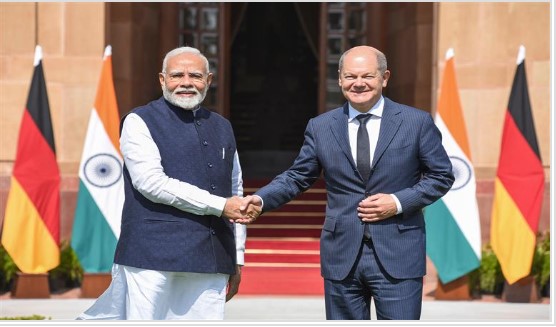
(Photo : PIB)
PM meets the Chancellor of Germany, Mr. Olaf Scholz at Hyderabad House, in New Delhi on October 25, 2024.
- German Chancellor Olaf Scholz aims to deepen defence ties with India, a strategic shift to counter China's influence.
- A potential partnership between German company Thyssenkrupp and Indian firms to build submarines in India is under consideration.
- Germany and India are enhancing collaboration in green energy, with Germany pledging 10 billion euros to help India achieve its climate goals.
- Germany will increase the number of visas granted annually to skilled Indian workers to 90,000, up from 20,000, boosting Germany's growth.
In a significant move to bolster bilateral ties, German Chancellor Olaf Scholz has expressed his intent to deepen defence ties with India, aiming to bring the two countries' militaries closer. This announcement came during his recent visit to New Delhi, where he met with Indian Prime Minister Narendra Modi. The move is seen as a strategic shift for Germany, which has traditionally not had close defence ties with India. However, the current geopolitical climate and the need to counter China's growing influence have prompted Germany to join India's effort to diversify its arms base, which has been heavily dependent on Russia for decades.
Chancellor Scholz, leading a high-level delegation, including most of his cabinet, underscored the importance of this partnership, stating, Our overall message is clear, we need more co-operation, not less. He further emphasized the need to deepen cooperation in defence and bring the militaries of the two nations together. This visit is seen as a strategic move by Germany to gain greater access to the vast Indian market, thereby reducing its reliance on China.
One of the key areas of cooperation discussed during the visit was the potential partnership between German company Thyssenkrupp and Indian firms to build six conventional submarines in India. The deal, estimated to be worth $5 billion, is currently under consideration by the Indian Navy, which is expected to make a decision between Thyssenkrupp and Spain's Navantia soon.
Germany and India: A Green Energy Partnership
In addition to defence, the two nations are also looking to enhance collaboration in green energy. Prime Minister Modi highlighted that India is completely transforming its physical infrastructure, with record investments being made. This transformation opens up numerous possibilities for German and Indo-Pacific region companies. In 2022, Germany pledged 10 billion euros to help India achieve its climate goals. German state lender KfW's unit DEG, which focuses on the private sector, plans to more than double investment in India to $1 billion over the next few years, focusing on renewable energy and infrastructure.
During the visit, Chancellor Scholz also reiterated his economy minister's push for swift progress on talks for a free-trade pact between India and the European Union. He expressed optimism that if both sides work together, the agreement could be reached in months rather than years. However, the negotiations have been slow, with India blaming the EU for what it called irrational standards.
In a significant development, Prime Minister Modi announced that Germany would dramatically increase the number of skilled Indians it permits to work in the country. The Scholz administration has decided to increase the number of visas granted annually to skilled Indian workers to 90,000, up from 20,000. This move is expected to give a new momentum to Germany's growth.
A New Era in Germany-India Relations
The visit by Chancellor Scholz is his third to India since last year, reflecting the growing importance of the relationship between the world's third- and fifth-largest economies. The leaders of both nations first signed a migration agreement two years ago to facilitate mobility for professionals and students, and this latest announcement is seen as a further strengthening of this agreement.
The discussions on deepening defence ties, enhancing cooperation in green energy, and the push for a swift conclusion to the EU-India free trade agreement underscore the strategic importance of this partnership. The increase in skilled worker visas from Germany to India further cements the economic and migration cooperation between the two nations.
* This is a contributed article and this content does not necessarily represent the views of btin.co.in









